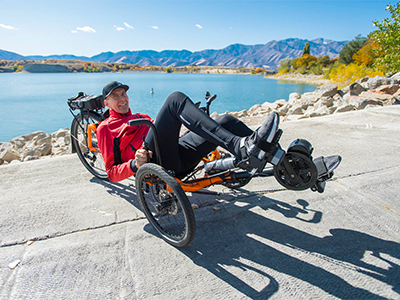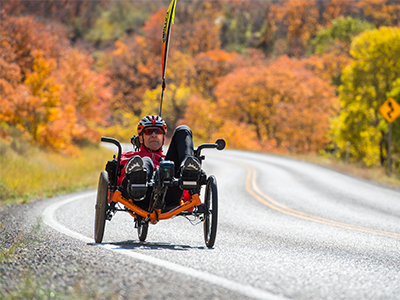My Battle With Depression, and What You Can Learn From It.
 Behind that smiling countenance and bullet-proof positive attitude that you’re likely
to encounter is the other me: frustrated, beaten down and yes, depressed. Sometimes.
Lately it feels like it’s more often than not. My aging spinal cord injury isn’t helping
things. Walking, even with crutches, is more difficult than ever. Two worn out painful
shoulders are awaiting replacement surgery. Leg spasms are ruling the day. Waaah.
Sounds like a lot of complaining to me.
Behind that smiling countenance and bullet-proof positive attitude that you’re likely
to encounter is the other me: frustrated, beaten down and yes, depressed. Sometimes.
Lately it feels like it’s more often than not. My aging spinal cord injury isn’t helping
things. Walking, even with crutches, is more difficult than ever. Two worn out painful
shoulders are awaiting replacement surgery. Leg spasms are ruling the day. Waaah.
Sounds like a lot of complaining to me.
Let’s call it grieving and move forward. So, what to do about depression? Seeing as how I’m a writer, I subscribe to the theory that knowledge is power, and I set out on a journey to find help in the form of smart people and good information. Fortunately, both are easy to find. Then it’s a matter of paying attention and acting.
As for smart, caring people, I found a gem in Christopher Pace at the University of Utah Rehabilition Hospital, for people with spinal cord injuries. Christopher is a Licensed Clinical Social Worker with insight into the issues that those of us living with paralysis face. He’s good at saving me from myself. After all these years, I’m still very good at beating myself up for having a disabled body, something I acquired thanks to one of life’s freakish moments.
Christopher reminds me that blaming myself for something I had no control over is a waste of energy and doesn’t change anything. He tells me to put my energy into something that does make a difference like writing or riding my recumbent trike. “Occupy your brain with actionable thoughts, rather than hollow self-criticism,” he said. Simple but powerful advice.
So, what else did I find to help with depression? Blue light therapy.
 I told Christopher how I hate the long dark nights and lack of sun that comes with
winter, and we discussed SAD (Seasonal Affective Disorder) a type of depression that's
related to changes in seasons and may be caused by a lack of sunlight. He suggested
I try blue light therapy. So, I now have a sleek six-inch by nine-inch blue light
panel I’m using for 10 minutes each morning, working up to 30 minutes a day. I’ll
keep you posted on its effectiveness.
I told Christopher how I hate the long dark nights and lack of sun that comes with
winter, and we discussed SAD (Seasonal Affective Disorder) a type of depression that's
related to changes in seasons and may be caused by a lack of sunlight. He suggested
I try blue light therapy. So, I now have a sleek six-inch by nine-inch blue light
panel I’m using for 10 minutes each morning, working up to 30 minutes a day. I’ll
keep you posted on its effectiveness.
I then turned to one of my favorite online sources, Web MD. They address the topic of depression with customary well-researched information, which I’m pleased to share here.
I’m hoping my new blue light panel will help.
Being depressed can make you feel helpless. You're not. Along with therapy and sometimes medication, there's a lot you can do on your own to fight back. Changing your behavior -- your physical activity, lifestyle, and even your way of thinking -- are all natural depression treatments.
These tips can help you feel better -- starting right now
1. Get in a routine.
If you’re depressed, you need a routine, says Ian Cook, MD. He's a psychiatrist and director of the Depression Research and Clinic Program at UCLA. Depression can strip away the structure from your life. One day melts into the next. Setting a gentle daily schedule can help you get back on track.
2. Set goals.
When you're depressed, you may feel like you can't accomplish anything. That makes you feel worse about yourself. To push back, set daily goals for yourself.
"Start very small," Cook says. "Make your goal something that you can succeed at, like doing the dishes every other day."
As you start to feel better, you can add more challenging daily goals
3. Exercise.
It temporarily boosts feel-good chemicals called endorphins. It may also have long-term benefits for people with depression. Regular exercise seems to encourage the brain to rewire itself in positive ways, Cook says.
How much exercise do you need? You don’t need to run marathons to get a benefit. Just walking a few times a week can help.

Getting on my trike helps me keep depression at bay.
4. Eat healthy.
There is no magic diet that fixes depression. It's a good idea to watch what you eat, though. If depression tends to make you overeat, getting in control of your eating will help you feel better.
Although nothing is definitive, Cook says there's evidence that foods with omega-3 fatty acids (such as salmon and tuna) and folic acid (such as spinach and avocado) could help ease depression.
5. Get enough sleep.
Depression can make it hard to get enough shut-eye, and too little sleep can make depression worse.
What can you do today? Start by making some changes to your lifestyle. Go to bed and get up at the same time every day. Try not to nap. Take all the distractions out of your bedroom -- no computer and no TV. In time, you may find your sleep improves.
These are just five of the eleven steps that Cook recommends for depression. If you want to see all eleven, go here.
There is no lack of self-help measures we can take to fight depression. We just have to take action.
For my own depression, I’ll begin with what I’ve discovered here and move forward. The key is to do something consistently and not give up.
